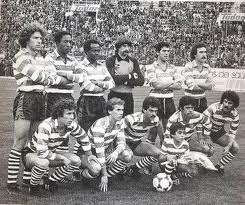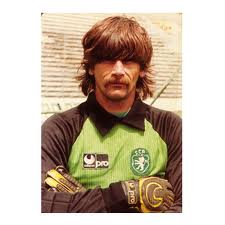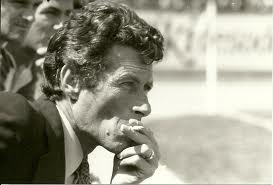"It was a great thing that he has been in our lives...."
So said Colin Bell, Manchester City and England's tireless schemer of the seventies, about the legendary Malcolm Allison, who's career and unorthodox approach to life has been dissected with the precision of a surgeon's knife over the years since his death in October 2010.
The Glory years of Mal's Maine Road tenure are well trodden. The Gory years that followed equally familiar to one and all, but the sometimes bleak sometimes vivacious end to his coaching career represented by the three jobs he held in Portugal make a fascinating postscript to an undulating story of one of football's great innovators.
Stop any Sporting Clube de Portugal follower of a certain vintage with the magical words "Big Mal" and they will regale you with his exploits on behalf of their team in season 1981-82, when the green and whites carried off a double of cup and league playing barnstorming, technically daring football that swept all before it.
They will speak of "um verdadeiro Mister" (a real football manager), of the larger than life character that England came to love or hate, but also of a man of subtlety and intuition, of candour and tenderness. A shy man, who hid behind the colourful bravado and braggadocio of BIG MAL.
Allison walked into a set-up at Sporting that was well prepared for success. Aside from Antonio Oliveira, a national team regular and the Hungarian national keeper Meszaros, Melo, Venâncio, Nogueira, Virgílio and Alberto all arrived that summer.
They were added to an already strong squad. Eurico, the defensive lynchpin was impressed by Allison's early excursions into creating a winning group. "He gave us responsibility. All players had the right to a glass of red wine with our lunch. I can well remember the immaculately dressed serving staff putting bottle of wine on our tables at meal times. In one of our first meals together at the beginning of Malcolm Allison's season with us, an employee served the wine and went to remove the bottles. Up went the shout from Mr Allison "leave those bottles where they are!"
 |
| Sporting line up in 81-82 |
As in England, everyone he came into contact with and especially those lucky enough to have worked closely with him, have a favourite story of the big man. Manuel Fernandes was Mal's choice at centre forward in the all-conquering Sporting side of 1981. He remembers a trip to Paris at the end of the season for a wind-down friendly after a triumphant close to the football year. “We went to Paris to play PSV Eindhoven in a friendly, end of season stuff. We were champions and had just brought home the Taça de Portugal (Portuguese cup) as well. After a good long dinner, we returned to the hotel. It was already two in the morning, so I said to Mr Allison, "Boss, what time do we get up in the morning?" I will never forget his reply. He looked at me, smiling, and said “Today, nobody's going to sleep. We are going out on the town in Paris. We are champions and now our job is to celebrate and enjoy each other's company. We will come back at six!"
 |
| Keeper Meszaros with hair + 'tache combo |
Mal's domestic success with Sporting had been tinged slightly with the disappointment of a failure to spark in European competition, a story that haunted him with City too. Having dismantled an excellent Southampton side containing the likes of Keegan, Channon and Alan Ball, Sporting slipped up against Neuchatel Xamax. Antonio Oliveira remembers the away leg on the south coast of England. “For this tie he decided to put me at right back. he said to our keeper, Meszaros, "When you have the ball, play it out to Oli down the right." Mal had seen a weakness in the Saints side and manoeuvred his best players into positions to attack that frailty. We won 4-2 at the Dell, Sporting's first ever away win on English soil.. What a night, what a tactician". Had Mal seen something in Nick Holmes to give him hope? It would not have been the first time that such a sentiment had been encouraged. Whatever the lead, Sporting mercilessly carried out the big man's orders, swift counter-attacking goals down the flank sinking the home side without trace. As the final whistle sounded, the British public were treated to one last proper Big Mal moment on national television. As rival boss McMenemy fled away down the cramped touchline, Big Mal could be seen ambling back to the dressing rooms surrounded by the adoring attention of the press photographers flashbulbs and microphones. It must have felt like a wonderful home-coming.
Goalkeeper Meszaros also has fond memories of Mal: "I owe him an awful lot. It was Mr Allison who brought me to Lisbon and afterwards to Setubal in 87-88. There was one detail which I will never ever forget. It came in a cup match at home to Boavista, which we were losing 2-1 at half-time. We, the players, were already in the dressing room. He just opened the door and said as calmly as you like, "If you want to win this match, give the ball to Mário Jorge.'' Then he shut the door again and hammered on it with his fists from the outside. We all looked at each other. In the 2nd half, Mário Jorge created the equaliser for Manuel Fernandes and was floored in the area for our penalty winner..."
Carlos Xavier was a youngster in the side: "Every time we played in Alvalade we were to be in the stadium at 10.30 and we would take "lunch" at this time too. Malcolm Allison told us that we could eat what we wanted, potatoes, eggs, meat, fish, pasta. You could choose. Until the match started, we would stay there inside the bowels of the stadium. By the time we left the changing rooms to go up to the pitch, we all had goosebumps. Everyone in the ground did, supporters, staff, players, because Mr Allison would go onto the pitch before us and walk a lap of the whole perimetre with his arms out, waving and gesticulating to the supporters with that amazing hat of his. He was like a show before the show, if you like. The supporters were whipped up into a state of near delirium by the time the match was due to start and we were too. We would hear live music playing, clearly hitting the notes of "o Comanchero".What a time that was. Malcolm's departure was the end of the golden period for that Sporting team."
The afore-mentioned Mario Jorge had seemed on his way out of Alvalade when Allison arrived, but the new coach managed to change things round for the wayward talent. "He liked to see the young players in action. he arranged an early training session and just wanted to see us pass, trap, receive and deliver the ball, simple stuff, nothing fancy. I remember being aware of how he was watching me pass and control the ball. After the session he asked me to stay at the club and he put his confidence in me. He kept his distance from the players, didn't say much but valued hard work and players he could rely on to perfom."
Despite his roaring success in the first year at Alvalade, Big Mal's job in Lisbon came to an abrupt end at the very beginning of the following season. He was fired by president João Rocha, another man who enjoyed the limelight. It was rumoured that Rocha could not stand the attention Mal was getting from the fans and, more importantly, the local and national media. The story was circulated that Mal had been drinking too much, a more than feasible excuse, as his high jinks and taste for alcohol and fast women had followed him into southern Europe, but there are those, who deny this to be the real reason for his somewhat precipitous departure.
Oliveira continues: “It was a deeply unjust process that was unleashed on Mr Allison. An agent was preparing the smooth arrival of Joszef Venglos and managed to invent a story that Allison had downed an impossible amount of alcohol." Although Malcolm's capacity to drink and carry on drinking had by this time transcended into legend, Oliveira doubts its veracity. Ironically, it was Oliveira that would be the immediate beneficiary of the new situation, substituting the departing Englishman in the capacity of player-manager whilst Venglos's contractual niceties were finalised.
As stated in the article The Great Chalkboard in the Sky, an unconfirmed story tells of Joao Rocha calling Mal to a meeting in his office, where there is a bottle of whisky in the middle of his desk. Rocha throws down his new contract and says "It is one or the other, Malcolm, you cannot have both." To which Allison, in true Dartford gunslinger style, picks up the bottle and departs. Other stories have Mal misbehaving on a grand scale during a pre-season trip to Bulgaria, where the trusty combination of drink and girls seems to have been augmented by the appearance of the local police in Sporting's hotel. This appears to have been the straw that broke the camel's back for Rocha. he could no longer countenance Mal's playboy shenanigans and, despite the fact that he had produced a swashbuckling winning side the like of which green and white fans would not witness for another 18 years (when the club finally brought home another league title under Lazslo Boloni), it heralded the parting of the ways.
Sporting was Mal's last big success. Flops, failures and truncated stays followed at Middlebrough, Kuwait (what a choice) and Bristol Rovers where he finally brought the curtain down on a career flaming in headlines since the early 60s. According to António Oliveira: “Malcolm was a man who enjoyed life to the full and wanted to transmit the joy of working in the industry of football to all of us players and staff."
Mal's squad, by the end of his tenure at Sporting looked like this:
Meszaros, Fidalgo, Virgílio, Barão, Eurico, Carlos Xavier, Bastos, Zezinho, Meneses, Inácio, Mário Jorge, Ademar, Marinho, Lito, Esmoriz, Nogueira, Freire, Manuel Fernandes, Oliveira and Jordão.
 |
| The life of Reilly |
They are still today considered one of Sporting's finest squads in the rich and textured past of this great Portuguese institution. Mal still had time to alight from the Destruction Express at a football outpost called Setubal. Based in the dowdy but characterful fishing port south of Lisbon, the local side was down on its luck slumbering in the 2nd division when the new coach breezed in under a cloud of blue cigar smoke one morning. Then as now, Setubal was a run-down, ramshackle sort of place. You can smell the salt from the estuary, the fish from the quays and the ever-present churascos (barbecues) along the Avenida Luisa Todi. If the wind is in the wrong direction, an awful funk pervades from the paper pulping factories by the great ship building sinks. Nevertheless it is a beautiful setting, with a wide estuary giving out onto the Troia Peninsular on one side and the elegant bulk of the Arrabida coast on the other. This is like the Cote d'Azur without the jungle of concrete and buzz of Porsche cabriolets. It is truly a lost paradise, 40 kilometres south of the bustling hub of Lisbon and 2 or 3 from Setubal. Mal would have loved the beach restaurants serving fresh ameijoas a bulhao pato (clams in white win sauce), the icy Vinho Verde (Portuguese sparkling green wine) and the gentle sunny climate Indeed, he holed up in a wonderful farmstead in the Arrabida hills, overlooking lush green valleys of fruit orchards on one side and the clear blue Atlantic on the other. It is an intoxicating place. He seems to have been taken by his life here almost immediately. The story goes that he was planning to lay down slightly more long term roots. He seems to have found some peace in this unassuming, slightly decrepit corner of south west Portugal.
He got back into coaching in a big way, the downtrodden Vitoria squad the obvious and immediate beneficiaries. Soon Mal had the rag-tag band of no-hopers on the way to promotion. It was around this time, mid 1987, that Vitoria's goalkeeping coach began to bring his son along to training sessions. His son was a Physical Education student in Lisbon and, even at that age, was keen to learn from interesting and innovative teachers.
 |
| Senhor Felix Mourinho |
Taking one look at Big Mal at work with the Vitoria squad, the young man was swiftly hooked. He became a permanent fixture at squad training. The goalkeeping coach was called Felix. Felix Mourinho. His son, Mal's last disciple, a self-confident young man who has long carried the same self-assured air of his mentor. José Mourinho's star may have slipped in recent years, just as Allison's was slipping as he ran out of time in Portugal, but the resemblance remains.


















.jpg)

